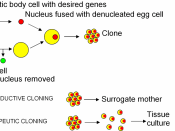Cloning has been a very controversial topic since it affects the moral values of human beings and other living things alike. Cloning crops has been around since the 1950's in America, aiding the world with more livestock and agricultural needs at a cheap and rapid rate. Cloning is done by scientists taking an egg and removing its nucleus, the part that includes, among other things, the bulk of the DNA. Next, they remove the nucleus from a cell belonging to the adult that is to be cloned and insert it into the egg. The reconstructed egg is stimulated, either electrically or chemically, to trick it into behaving like a fertilized egg. If this is successful, the egg divides and becomes an embryo, which is then transferred into the uterus of a surrogate mother. Pregnancy then follows its normal course (Campbell 64)
In February 1997 scientists in Scotland announced the birth of the first cloned sheep named Dolly. Dolly heralded the future of cloning possibilities and scientists began extensive experiments on cloning and have since then cloned both plants and animals successfully. Plant cloning had been going on for many years before Dolly with little to no controversy. Some companies have been altering genes of animals with genes of humans to produce proteins needed to fight cancer and other diseases. Cloning may further enhance this procedure which will help catalyst this treatment easily past the human testing stage into curing these horrific diseases.
The next step was to clone actual human beings, but before experiments could have been carried out pressure started to build on the scientists because people started to doubt if cloning was ethical and morally correct. The process of cloning scientifically means to genetically copy an organism and create a 'replica' that has the same DNA, whose...


